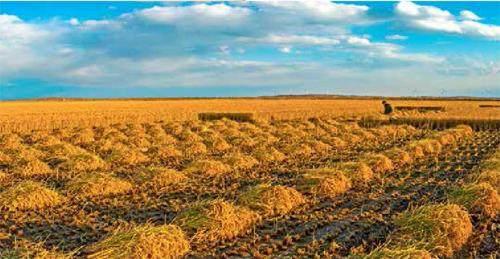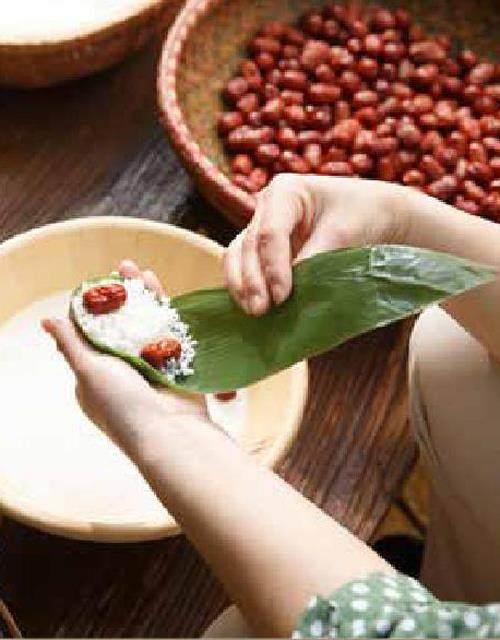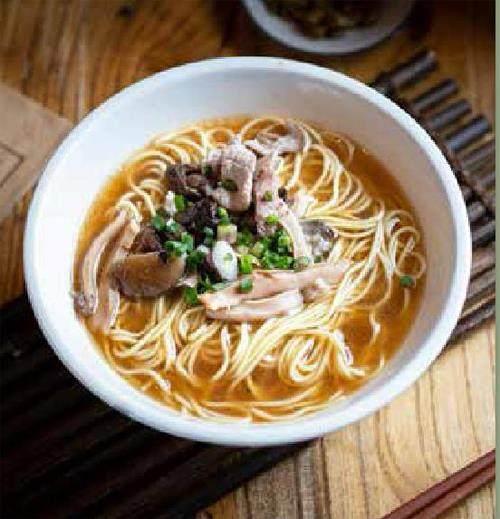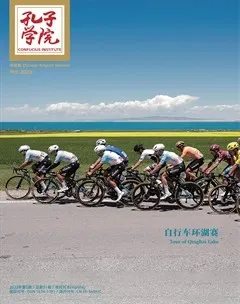二十四节气之芒种和夏至
何芷翌



芒種
Mangzhong
芒种是二十四节气中的第九个节气,夏季的第三个节气。每年的阳历6 月5 日左右,即仲夏开始的时候,就是芒种。“芒种”的字面意思是“有芒的麦子快收,有芒的稻子快种”。这个时节,气温持续升高,雨量日益丰沛,农民忙着收割冬天播种的小麦,同时还要忙着插秧种稻。这就是人们说的“芒种忙两头,忙收又忙种”。
Mangzhong, or Grain in Ear, is the ninthsolar term among the 24 Solar Terms, and thethird solar term of summer. It usually fallsaround June 5th on the Gregorian calendar,marking the beginning of the midsummer. Itsliteral meaning is “wheat with awns is readyto be harvested, rice with awns is ready to beplanted.” During this period, the temperaturecontinues to rise, and rainfall becomesabundant. Farmers are busy harvesting wintersownwheat and simultaneously transplantingrice seedlings. This is what people refer to as“busy both with harvest and planting duringGrain in Ear.”
芒种时节,许多花朵开始凋零。在民俗和神话中,这是花神离开凡间,回到天上“述职”去了。所以,在芒种这天,民间盛行送花神的习俗,以表达对花神的感谢。此外,芒种时节也是梅子成熟的季节,一些地方有煮梅的习俗。人们一边欣赏窗外的绵绵细雨,一边品尝刚刚煮好的梅子,颇有几分 “青梅煮酒论英雄”的快意。
During the season, many flowers begin to wither.In folklore and mythology, this is when the flower deityleaves the mortal realm and returns to heaven to “reporther duties.” Therefore, on the day of Mangzhong, it iscustomary for people to offer flowers to the deity asan expression of gratitude. Additionally, it is also theseason when plums ripen; therefore, some regionshave the tradition of cooking plums during this timeof year. While savoring freshly cooked plums, peoplewould enjoy the gentle rain outside the window, as ifthey were re-enacting a scene from The Romance of theThree Kingdoms, where “Cao Cao and Liu Bei discussedheroes over green plums and cooked wine.”
芒种时节最重要的习俗是过端午。端午节在中国已经有两千多年的历史。每年的这一天,家家户户都悬钟馗像、挂艾叶、吃粽子、赛龙舟、饮雄黄酒、佩香囊等,以拜神祭祖、祈福辟邪。其中,过端午吃粽子,是为了纪念伟大的爱国诗人屈原。战国时期,诸侯争斗,战事频发,忧国忧民的屈原劝说楚怀王联合齐国共同抗秦,可楚怀王不听。屈原一次次谏言无果,反遭奸臣排挤,被流放到洞庭湖边。不久,楚国兵败的消息传来,屈原伤心地放声大哭,在五月初的一天跳进汨罗江自尽了。人们听闻后,为了防止屈原的尸身被鱼虾吃掉,便把米饭包成粽子投入江中,供鱼虾吃。此后,便有了端午节包粽子、吃粽子的传统习俗。
The most important custom during the Mangzhongperiod is the celebration of the Dragon Boat Festival.The festival has a history of over two thousand years inChina. On this day each year, every household hangsup pictures of Zhong Kui, a Taoist vanquisher of ghostsand evil beings, along with mugwort leaves, eats zongzi (sticky rice dumplings), holds dragon boatraces, drinks realgar wine, and carriesfragrant sachets, all to pay respects to godsand ancestors and to pray for blessings andward off evil spirits. Among these customs,eating zongzi during the Dragon BoatFestival symbolizes the commemoration ofthe great patriotic poet Qu Yuan (c. 340 BC —278 BC). During the Warring States Period,as the feudal lords fought and wars raged,Qu Yuan, who deeply cared for his countryand people, tried to persuade King Huai ofChu to unite with the state of Qi to resistthe state of Qin. However, the king refusedto listen. Qu Yuan’s repeated admonitionsfell on deaf ears. Ostracized by treacherousofficials, he was eventually exiled to the landnear Lake Dongting. Shortly after, news ofhis state’s defeat reached him. In grief, hecast himself into the Miluo River one dayin early May. Fearing that Qu Yuan’s bodywould be eaten by fish and shrimps, thelocal people threw rice wrapped up in leavesinto the river to feed the aquatic creatures.This is how the tradition of making andeating zongzi during the Dragon BoatFestival came into being.
夏至
Xiazhi
夏至是二十四节气中的第十个节气,也是最早被确定的节气之一。每年的6 月21 日或22 日,太阳运行到黄经90°时,为夏至日。这一天,太阳直射地面的位置达到一年中的最北端,直射北回归线,北半球白昼时间达到全年最长,之后太阳直射点逐渐南移,北半球白昼逐渐变短。因此,我国很多地方有“吃过夏至面,一天短一线”的说法。
Xiazhi, or the Summer Solstice, is the tenthsolar term in the 24 Solar Terms, one of theearliest solar terms to be determined. It fallson June 21st or 22nd each year when the sunreaches 90 degrees of celestial longitude. On thisday, the position on the Earth’s surface wherethe sun shines directly reaches its northernmostpoint of the year, crossing the Tropic of Cancer.Afterward, the sun’s direct rays gradually movesouthward, and the length of daylight in theNorthern Hemisphere gradually decreases.Therefore, in many parts of China, there is asaying, “After eating Summer Solstice noodles,daylight will become shorter day by day.”
此時,长江中下游地区正处在梅雨季,北方黄河下游平原雨水增多,高原牧区则进入了草肥畜旺的黄金季节。这时,全国大多数地方不仅闷热,而且骤来疾去的雷雨很多,尤需注意防洪防涝。这期间,庄稼生长很快,杂草亦如此,还容易出现病虫害,所以整枝打杈、中耕除草、防治害虫、清沟排水等田间管理也非常重要。
During this time, the middle and lower reaches ofthe Yangtze River are in the rainy season, and there isincreased rainfall in the plain areas of the lower reachesof the Yellow River in the north, while the pastoral areason the highland enter the golden season: The grass isnow abundant, and the livestock thrives. During thisperiod, most parts of the country not only are hot andhumid, but also experience frequent thunderstorms.People start to pay special attention to flood control andprevention of waterlogging. Crop growth is rapid, so isthe growth of weeds, and the risk of diseases and pestsincreases. Therefore, field management such as pruning,intertillage, weed control, pest control, and canal clearingand drainage is of great importance.
早在宋代,在水乡江南一带,夏至日便是赏荷观莲的日子。人们在这一天举家来到池塘、湖边泛舟赏荷、消夏纳凉,荡舟轻波、采莲弄藕,好不惬意。在中国,北京圆明园、杭州西湖、济南大明湖等都是观赏荷花的好去处,人们可以领略到“红衣翠扇映清波”的美景。
As early as the Song Dynasty, in the water towns southof the Yangtze River, Xiazhi was a day for appreciating lotusflowers. On this day, people would come to see the pondsand lakes, paddle boats for a closer look at the lotus flowers,and seek relief from the summer heat. It was such a delightto pick lotus flowers and harvest lotus roots on a boatgentling rocked by the waves. In China, great destinationsfor admiring lotus flowers are the Summer Palace in Beijing,the West Lake in Hangzhou, and the Daming Lake in Jinan,where people can appreciate the beautifulscenery of “red garments and green fansreflected on clear waves” as in the Qing poetChen Can’s “Breeze-ruffled Lotus at QuyuanGarden.”
以前,在我国很多地方,人们还在夏至日互赠折扇、脂粉等消夏避暑物品。折扇用来扇风散热,脂粉涂抹在身上可以防止生痱子。在古代宫廷,夏至之后,会取出“冬藏夏用”的冰块消暑降温。
In the past, in many places of China, peoplewould exchange folding fans, cosmetic powder,and other gifts that could make the hot daysslightly easy during the Xiazhi period. Foldingfans were used to fan and cool down, whilecosmetic powder was applied to prevent heatrash. In ancient courts, after Xiazhi, ice blockspreserved from winter would be used to cooldown and lower the temperature.
夏至时节人体出汗较多,盐分损失较大。中医会建议人们多食用一些带有酸味的食物,以达到“固表止汗”的效果。此外,多吃绿豆可以消暑利尿,补充水分和矿物质。
During the Xiazhi period, people tend tosweat more and lose more salt. TraditionalChinese medicine therefore recommendsconsuming foods with a sour taste to“strengthen the exterior and stop sweating.”Additionally, eating mung beans is alsoencouraged for the benefit of relieving heat,promoting urination, and replenishing fluidsand minerals.

